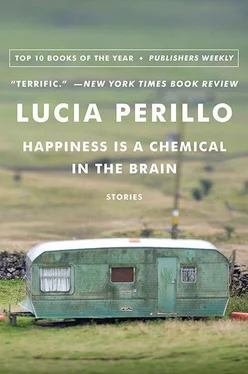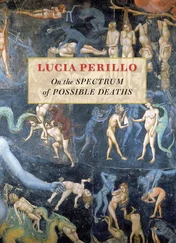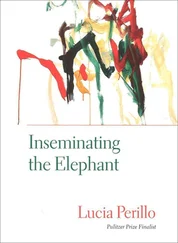
WHAT YOUR SON has done is break into a house, in the company of another boy, with whom he microwaved the telephone and an expensive collection of Hummel figurines. This would have not been so bad — in fact, the idea interested you: how the telephone looked as it melted into itself, as observed by your son peering through the window into the little lighted booth. But the boys also turned on the water taps and left them running, causing thousands of dollars’ damage, and so instead you tried to do something stern with your face when you asked him why. Of course, your son merely shrugged, your son being a maestro of the shrug — slowly his shoulders traveled toward his ears, his right one elevated slightly higher and his head cocked in that direction while simultaneously his right eyebrow lifted and his left eye squinched. The movement of the arms lags slightly behind that of the shoulders, the hands led by the meat at the base of the thumb as they rise up, flip over, and come to rest palms up, in the posture of Jesus.
Finally your son said, “Skipper wanted me to do it.”
Then the words came to you as if you were dredging up deep silt: “Well, if Skipper wanted you to jump off a bridge, would you do it?” This was what your own mother had said. You remember wondering what the bridge had to do with anything.
Your son considered for a moment, still holding the Jesus pose.
“Sure,” he said.

IT DOES NOT MATTER if your place in the world is small: you make the food, you clean the house. You know the only true world is the one you carry inside of you, and what appeals to you about cleaning is the way it gives you hope that this interior world can be perfected — you can run a toothpick around the creases in the stove and in this manner attain enlightenment. And it turns out that you are not sorry at all that you bought the Denby (which you hide in the closet, your forty-five-dollar secret). You use its crevice tool between the floorboards, extracting hairs that have lain stretched out for a century, now restored to their natural curl.
The Denby even has a glass-topped reservoir where you can see the ancient crumbs collect, magically, in the shape of the letter D (for Denby!). There is an explanation, of course, a metal grid in the shape of the D through which the air gets sucked. But to you it is Ouija, inverted: the ghosts bring the letter to you instead of making you discover it. And these are ghosts who have no special fondness for suspense. These are reliable ghosts who’d just as soon have you always end up with the letter D .
So there is this to entertain you — seeing the D appear again and again. And there is also lying in your upstairs bedroom with a bottle of cough syrup, Doctor Vicks. In the bed pushed against the southern window through which you watch the bigleaf maple leaves light up before they fall, the quilts smell like your mother who died long ago. And there is also putting on your husband’s old coat, tramping rubber-booted along the creek with Doctor Vicks a small red man in your pocket. When the wind picks up and makes the limbs click, you can find a place to stand where the birches will accommodate your arms’ spread, your head thrown back and your roar drowned by the louder roaring of the creek. So how come everybody thinks it’s you and not the creek who’s crazy?

YOUR SON WAS BORN only fifteen years ago, and yet you are starting to forget how it was when he was in your body. You remember that the pain grew intense and then you’d begged to be put out: the world went dark for a while and when you woke they handed you a perfect son. And because you were not aware of his leaving, it was easy to forget that he had left — sometimes you dreamed him still inside you until you woke to hear him crying. Or crawling around, creaking the floors. Or as he is now: lying on his bed with the headphones on, his body jerking as if it were being zapped by a thousand volts.
But is he not like any other kid? Okay, he has destroyed a house, but he has also promised not to do it again. Hard to tell at this point whether your husband’s plan has worked — to bring the boy out to the woods to save him. Sometimes your husband will be standing in your son’s bedroom, angrily brandishing a film canister that holds your son’s meager stash of pot. Your husband shakes this rattle like a shaman, and your son resists by refusing to take the headphones off, so that he twitches like a zombie on the bed while your husband yells. It’s a creepy ceremony, so you stay downstairs when it’s going on.
Often at night your son sneaks into the woods. Your husband’s idea is to install double deadbolts and hide the key, but you have dreams of fire, the three of you black fetuses crouched before the door. It wouldn’t work anyway, for your son can also use the gutters as his means of escape. Sometimes you hear him rattling down the spouts, and then, flashlight in hand, your husband is off chasing him across the lawn. But your son is quick and knows the shortest route to each trailhead. Useless to go after him with a car: he can get anywhere without a road. Out of the three of you, he is the one who’s come to love the country best.
Your job is to keep tabs on your son — since, as your husband points out, you’re not doing anything anyway — though his suggestions are ridiculous: that you walk your son to school, that you establish a lookout from which you can see him should he leave the schoolyard. Instead, you and your son conspire to indulge each other’s silences, and he is grateful. He even shows you the drawings he makes in the margins of his textbooks, cities being devoured by strange machines.
But then one day you betray this trust by following him: at the end of the drive you watch him stuff his muffler in the mailbox. Then he crosses the road and continues down the railroad right-of-way, where another boy is waiting. They walk along smoking cigarettes that they hold between their thumb and fingers in an attempt to look like men, though their backpacks are overscaled to their bodies and the sleeves of their plaid jackets fall too low on their hands. The autumn woods are brown and bright as the boys crunch along on the gravel, while fifty yards back you’re carefully stepping from tie to tie.
Where the tracks veer over the creek, they walk to the middle of the bridge’s rusted trapezoid and sit on the ends of the ties with their legs swinging in the air above the water. The other boy extracts from his pack the bulky object you’d assumed was books: a radio instead. They sit there with their shoulders hunched like the wings of perching hawks, their wrists crossed between their legs, smoke rising from their crotches as they wiggle listlessly to rap music. Sometimes laughter erupts from them: your son’s high giggle, the other boy’s loud bray. You cannot hear their words except for when one occasionally rises above its brothers: douche bag or chickenshit . Your son and his friend are so boring that your follicles prickle, and you have no choice but to let your feet go to sleep because the boys might hear you if you stamped them in the gravel.
Finally what they must be waiting for happens: you have to fight the urge to shout, because surely they too can feel the way the tracks begin to sing. Reluctantly, slowly, the other boy gathers his boom box, and he and your son each move to the outside of one of the bridge’s I-beams, where he places the radio in the hollow between his feet. Their toes fit inside the beams; the heels of their boots quiver in the air. They hold on with all their might as a dozen freight cars whoosh past. The girders scream like a sawmill as the log runs through it, the boys hugging tight with their long hair blowing behind them in the shape of fans, their teeth gritted and their mouths flaring with the effort of trying not to be blown backward off the bridge.
Читать дальше













